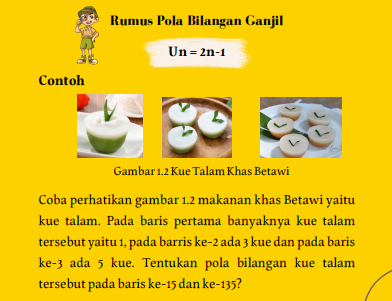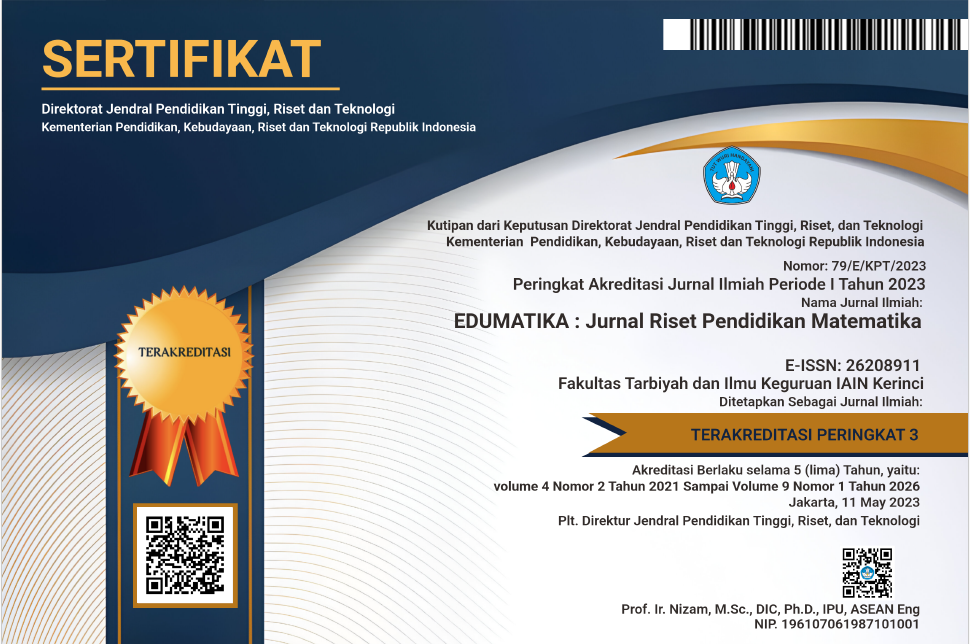Developing Ethnomathematics-based E-Modules to Support Students’ Problem Solving Skills
Abstract
The lack of learning resources and learning media have an impact on reducing the quality of learning. Learning media innovation is needed to provide interactive and joyful learning and integrate cultural context. This research aims to create an ethnomathematics-based electronic module on the topic of number patterns based on ethnomathematics to support students' problem solving skills. This research uses 4D model (define, design, develop, and disseminate). This research involved 29 eighth-grade students from one of the junior high schools in Metro, Indonesia. The research results show that the ethnomathematics-based electronic module on number patterns topic meets the criteria for being suitable for use in learning based on experts review and is able to attract student interest. This fact indicates that ethnomathematics-based modules can be an innovative solution in improving the quality of mathematics learning in the digital era.
Downloads
References
Acharya, B. R. (2017). Factors affecting difficulties in learning mathematics by mathematics learners. International Journal of Elementary Education, 6(2), 8-15. https://doi.org/10.11648/j.ijeedu.20170602.11
Azwar, S. (2013). Validitas dan Reliablitas. Yogyakarta: Pustaka Pelajar
Bintoro, H. S., Rahayu, R., & Murti, A. C. (2021). Design of Ethnomathematics Mobile Module to Facilitate Students Mathematical Thinking Ability. AKSIOMA: Jurnal Program Studi Pendidikan Matematika, 10(4), 2362-2372. http://doi.org/10.24127/ajpm.v10i4.4169
Cahyadi, W., Faradisa, M., Cayani, S., & Syafri, F. S. (2020). Etnomatematika untuk Meningkatkan Kemampuan Pemecahan Masalah Matematis Siswa. ARITHMETIC: Academic Journal of Math, 2(2), 157-168. https://doi.org/10.29240/ja.v2i2.2235
Choirudin, C., Ningsih, E. F., Amrulloh, H., Anwar, M. S., Azizah, I. N., & Prastika, M. S. (2020). Development of Learning Media for Ethnomathematics and Culture of Lampung with the Powtoon Application. Jurnal Tadris Matematika, 3(2), 141-152. https://doi.org/10.21274/jtm.2020.3.2.141-152
Davita, P. W. C., & Pujiastuti, H. (2020). Analisis Kemampuan Pemecahan Masalah Matematika Ditinjau dari Gender. Kreano, Jurnal Matematika Kreatif-Inovatif, 11(1), 110–117. https://doi.org/10.15294/kreano.v11i1.23601
D'Apice, C., & Manzo, R. (2005). How Learning Mathematics Can Be Made More Enjoyable. International Journal for Technology in Mathematics Education, 11(4), 147-152. https://www.learntechlib.org/p/107510/
Fouze, A. Q., & Amit, M. (2017). Development of mathematical thinking through integration of ethnomathematic folklore game in math instruction. Eurasia Journal of Mathematics, Science and Technology Education, 14(2), 617-630. https://doi.org/10.12973/ejmste/80626
Kahu, E., Nelson, K., & Picton, C. (2017). Student interest as a key driver of engagement for first year students. Student Success, 8(2), 55-66. https://doi.org/10.5204/ssj.v8i2.379
Laili, I., Ganefri, & Usmeldi. (2019). Efektivitas Pengembangan E-Modul Project Based Learning pada Mata Pelajaran Instalasi Motor Listrik. Jurnal Imiah Pendidikan dan Pembelajaran, 3(3), 306–315. https://doi.org/10.23887/jipp.v3i3.21840
Lewalter, D., Diedrich, J., Goldhammer, F., Köller, O., & Reiss, K. (Eds.). (2023). PISA 2022: Analyse der Bildungsergebnisse in Deutschland. Waxmann Verlag. https://doi.org/10.31244/9783830998488
Lian, L. H. (2023). Assessment of Higher-Order Thinking Skills: Is it Simply Determined by Verbs?. International Journal of Academic Research in Progressive Education and Development, 12(2), 755-763. https://ijarped.com/index.php/journal/article/view/1212
Lisnani, L., Setiawan, A. D., Stevani, A. L., & Septian, A. I. (2020). Pendampingan Pembelajaran Matematika Materi Operasi Perkalian bagi Siswa SD Kelas II SDN 42 Palembang. Jurnal Terapan Abdimas, 5(1), 21-27. https://doi.org/10.25273/jta.v5i1.4642
Lubis, U. A., Rizqi, N. R., & Maharani, I. (2023). Exploration of Ethnomathematics as a Learning Resource in Culinary Tourism Kamu Market. Jurnal Eduscience, 10(2), 549–561. https://doi.org/10.36987/jes.v10i2.4557
Maryati, M., & Prahmana, R. C. I. (2018). Ethnomathematics: Exploring the Activities of Designing Kebaya Kartini. MaPan: Jurnal Matematika dan Pembelajaran, 6(1), 11–19. https://doi.org/10.24252/mapan.2018v6n1a2
Nuryati, S. (2022). Pengembangan Modul Pembelajaran Matematika pada Materi Program Linear Kelas XI SMA/MA Berbasis TCK (Bachelor's Thesis, Universitas Islam Negeri Ar-Raniry). https://repository.ar-raniry.ac.id/id/eprint/26461/
Pathuddin, H., Kamariah, K. & Nawawi, M. I. (2021). Buginese Ethnomathematics: Barongko Cake Explorations as Mathematics Learning Resources. Journal on Mathematics Education, 12(2), 295-312. https://doi.org/10.22342/jme.12.2.12695.295-312
Patri, S. F. D., & Heswari, S. (2021, March). Development of ethnomathematic-based on mathematics e-module to improve students’ logical thinking skills. In AIP Conference Proceedings (Vol. 2330, No. 1). AIP Publishing. https://doi.org/10.1063/5.0043250
Prahmana, R. C. I., & D'Ambrosio, U. (2020). Learning Geometry and Values from Patterns: Ethnomathematics on the Batik Patterns of Yogyakarta, Indonesia. Journal on Mathematics Education, 11(3), 439-456. https://doi.org/10.22342/jme.11.3.12949.439-456
Putri, M., & Junaedi, I. (2022). Development of Ethnomathematics-Based E-Module Using the Inquiry Learning Model to Improve Mathematical Problem Solving Ability. Unnes Journal of Mathematics Education, 11(2), 174-182. https://doi.org/10.15294/ujme.v11i2.59938
Sulistyaningsih, D., Waluya, B., Isnarto, I., & Sugiman, S. (2023, June). Pengembangan E-Modul Berbasis Etnomatematika Materi Pola Bilangan Untuk Meningkatkan Kemampuan Pemecahan Masalah Siswa. In Prosiding Seminar Nasional Pascasarjana (Vol. 6, No. 1, pp. 1006-1012). Universitas Negeri Semarang. https://proceeding.unnes.ac.id/snpasca/article/view/2257
Suryani, M., Jufri, L. H., & Putri, T. A. (2020). Analisis Kemampuan Pemecahan Masalah Siswa Berdasarkan Kemampuan Awal Matematika. Mosharafa: Jurnal Pendidikan Matematika, 9(1), 119–130. https://doi.org/10.31980/mosharafa.v9i1.597
Suryaningsih, T., & Putriyani, I. J. (2022). Pengembangan E-Modul Pembelajaran Matematika Berbasis Etnomatematika Betawi pada Materi Bangun Datar Kelas IV MI/SD. JMIE (Journal of Madrasah Ibtidaiyah Education), 6(1), 103-115. https://doi.org/10.32934/jmie.v6i1.366
Susanti, E., Nisa, R. A., Azhari, M. N., & Marhayati, M. (2020). Ethnomathematics Exploration: Number Patterns in Bamboo Woven Crafts in Tulungagung. Matematika dan Pembelajaran, 8(1), 87-101. https://doi.org/10.33477/mp.v8i1.1364
Sutarto, Muzaki, A., Hastuti, I. D., Fujiaturrahman, S., & Untu, Z. (2022). Development of an Ethnomathematics-Based e-Module to Improve Students' Metacognitive Ability in 3D Geometry Topic. International Journal of Interactive Mobile Technologies, 16(3), 32-46. https://doi.org/10.3991/ijim.v16i03.24949
Thiagarajan, S. et al. (1974). Instructional development for training teachers of exceptional children: A sourcebook. Indiana University. https://files.eric.ed.gov/fulltext/ED090725.pdf
Utami, R. E., Nugroho, A. A., Dwijayanti, I., & Sukarno, A. (2018). Pengembangan E-Modul Berbasis Etnomatematika untuk Meningkatkan Kemampuan Pemecahan Masalah. JNPM (Jurnal Nasional Pendidikan Matematika), 2(2), 268-283. https://doi.org/10.33603/jnpm.v2i2.1458
Yudianto, E., Febriyanti, R. A., Sunardi, S., Sugiarti, T., & Mutrofin, M. (2021). Eksplorasi Etnomatematika pada Masjid Jami’ Al-Baitul Amien Jember. Ethnomathematics Journal, 2(1), 11–20. https://doi.org/10.21831/ej.v2i1.36329
Yuliana, Y., Usodo, B., & Riyadi, R. (2023). The new way improve mathematical literacy in elementary school: Ethnomathematics module with realistic mathematics education. AL-ISHLAH: Jurnal Pendidikan, 15(1), 33-44. https://doi.org/10.35445/alishlah.v15i1.2591

Copyright (c) 2024 Jezlina Hamid, Nur Indah Rahmawati

This work is licensed under a Creative Commons Attribution 4.0 International License.














